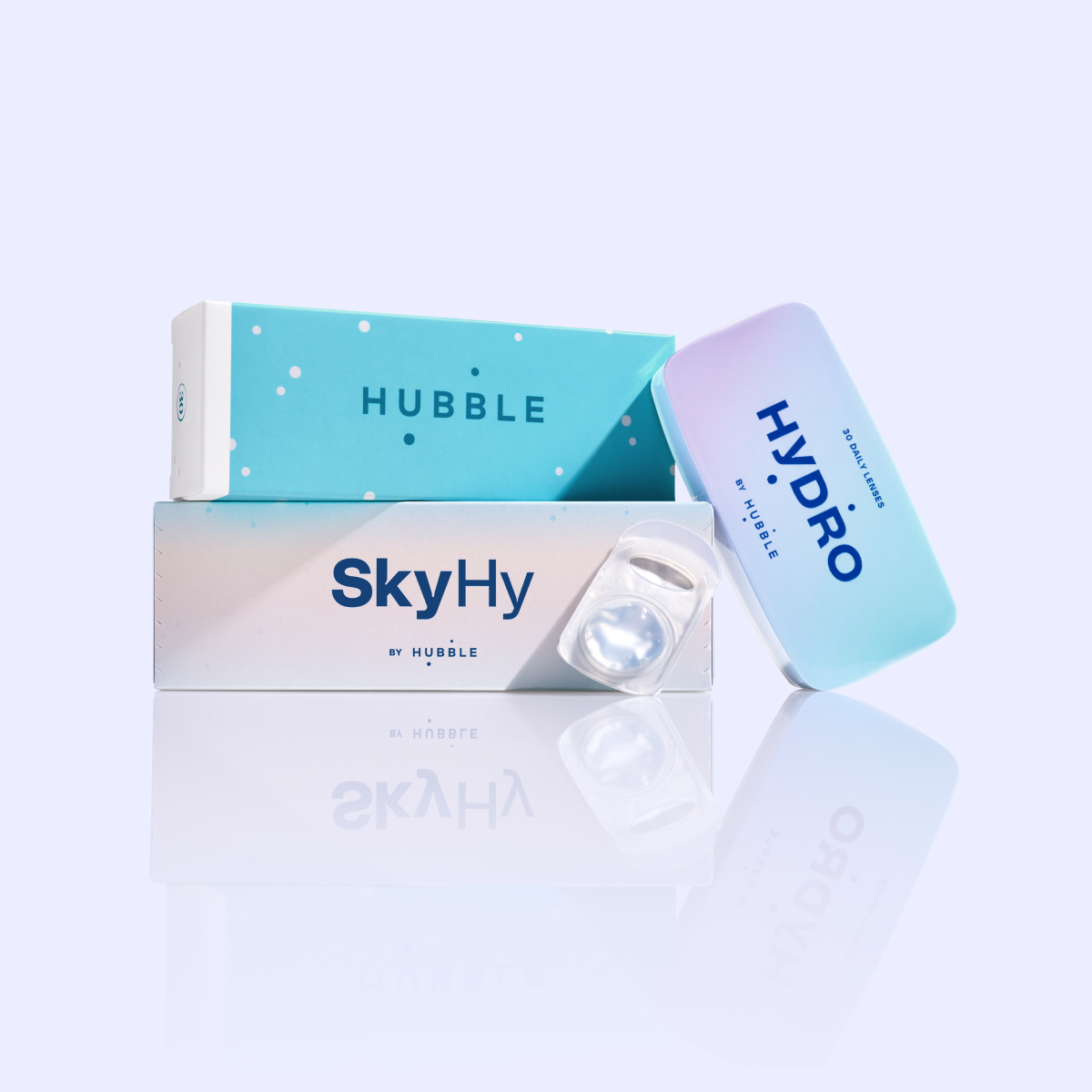Daily vs Monthly Lenses: The Best Contacts Choice for You

When it comes time to choose the best contacts, the number of types and brands can be overwhelming. While your eye care professional can guide you through the process, understanding which contacts best meet your needs can help open the discussion and ensure you get the best experience. Hubble Contacts simplifies this process for you.
One of the most important considerations: is daily vs. monthly contact lenses. Choosing between these types of contacts goes deeper than just when they need to be changed—each has its own pros and cons in terms of performance, durability, and flexibility. Today, we’ll compare these two types of contacts to help you decide which is best for you.
Daily Disposable Contacts
Daily disposable contact lenses—sometimes called dailies—are designed to be worn for only one day. Unlike other types of contacts that are cleaned and soaked in contact lens solution after use, daily contacts are discarded daily—each day starts with a new pair.
The primary benefit of daily contacts is that the lenses stay fresh. Because a new pair is used daily, you can be sure the lenses are clean and fresh. This not only helps with overall performance, but it can also lower the risk of potential issues such as eye infections.
Due to their short-term use, daily contacts are generally thinner than other disposable contacts. This makes them more prone to tears or rips and can lead to more buildup of protein and other deposits on the lens. That’s why the lenses should not be used more than one time.
Daily contacts are gaining popularity in recent years as the price of these lenses decreases. Previously, the production costs—combined with the quantity of lenses needed—made daily contacts a costly choice. However, high-quality daily contacts are now developed more efficiently and at lower costs.
The benefits of a fresh pair of lenses daily coupled with affordable price points have led to many opting for daily contacts. This is especially true if you order contacts through a subscription service like Hubble. Nothing beats the convenience of choosing how often you want to receive your disposable lenses and having them show up at your door like clockwork.

Monthly Contacts
On the other hand, monthly contacts are designed to be worn for up to one month. To keep the lenses clean, the contacts are soaked in contact solution—typically overnight—so that they can be safely worn the following day.
In this way, monthly contacts are very similar to bi-weekly contacts, another common type of disposable contacts. For either of these types, it’s important to replace your contacts on schedule to avoid negative effects like blurriness and dry eyes, as well as potentially serious issues like eye infection.
Monthly contacts are generally thicker and more durable being that they are put in and taken out throughout the month. Monthly contacts also provide additional flexibility for those traveling or with busier lifestyles. There’s no need to plan ahead with a certain number of new contacts—all you need is a storage case and cleaning solution to travel. This also leads to less waste, as 12 pairs of contacts will cover the year, as opposed to 365 pairs for daily contacts.
However, nightly cleaning won’t entirely remove the buildup of deposits on the lenses. Over the course of the month, performance can weaken and the lenses may become less comfortable.
Daily vs. Monthly Contacts: Factors to Consider
There’s no universal choice for which type of contacts are best. Ultimately, the choice of whether to go with daily or monthly contacts will depend on a variety of factors that will change from person to person. Let’s take a look at some of the key areas to consider when making your choice.
Performance
Both daily and monthly silicone hydrogel contact lenses are an effective way to correct vision—and each may provide enhanced performance than glasses. Because contacts sit directly on the eye, vision correction is often sharper than glasses.
When comparing the two, daily contacts may provide better performance due to the lens being new each day. Having a fresh lens minimizes the amount of buildup or wear, ensuring that your vision is crisp and clear. Even with proper care, monthly contacts can still be hampered by deposits on the lens, especially toward the end of the month.
In terms of durability, monthly lenses come out ahead. Because they’re designed to last for the entire month, the lenses are thicker than daily contacts, providing extra resistance to rips or tears.
Eye Health
All types of contacts are perfectly safe when worn properly. That being said, some types of contacts require more care than others, and proper care is essential for keeping your eyes healthy.
For example, because monthly contacts require daily cleaning and care, there may be additional risk for eye health issues to develop. Not changing these lenses on schedule can lead to issues such as dry eyes, redness, or irritation caused by buildup accumulated on the lens over time. One of the most serious potential issues is an eye infection. Eye infections can range in severity, but the most serious cases can even cause blindness.
That being said, these issues can happen with any type of contact if not cared for properly. Therefore, it’s critical to take your contacts out each night, change them and schedule, and wash your hands when working with contacts.
Comfort and Sensitivity
Contact lens comfort has improved over time as new lens materials were introduced. The most common type of material prescribed today is silicone hydrogel which offers strong oxygen permeability, which some wearers may find more comfortable.
Both daily and monthly silicone hydrogel contacts are available. However, because daily contacts are thinner and allow oxygen to reach the eye easily, they may provide additional comfort to wearers. This is especially true when compared to monthly contacts nearing the end of their lifespan.
Your eye care professional can provide a recommendation of which material is best for your individual needs. Though silicone hydrogel is the most common, there are plenty of other options that may be suitable depending on your budget and preferences.
Contact Lens Prescription
Depending on your needs, only certain types of contacts may be available to you. In general, monthly contacts can accommodate a wider range of prescriptions and needs because there are more options on the market. This is especially true for those with specialized lens types such as multifocal lenses.
Can I Switch Between Daily Disposable Contacts and Monthly Contacts?
Many contact lens wearers wonder if they can alternate between daily disposable and monthly contact lenses. The good news is, yes, you can switch between the two types of contacts, provided you follow the correct usage and care guidelines for each type.
Consult Your Eye Care Professional: Before switching, it's essential to get advice from your optometrist. They can guide you on the right type of lenses based on your eye health and lifestyle needs.
Understand Each Type's Care Requirements: Daily disposables are meant for one-time use and require no cleaning, while monthly lenses need regular cleaning and proper storage.
Consider Your Lifestyle: Switching between the two can be convenient for different occasions—daily disposables for travel or outdoor activities, and monthlies for regular, everyday use.
Be Aware of Eye Adjustment: Your eyes may need time to adjust when switching between different types of lenses. Pay attention to any discomfort and consult your optometrist if it persists.
Maintain Hygiene Practices: Regardless of the type, always practice good hygiene to reduce the risk of eye infections.
Lifestyle
Certain lifestyles may influence which type of contacts to go with. On one hand, if you live active lifestyles—such as playing sports, hiking, or working out—you may benefit from daily contacts. During these activities, sweat or dirt can get into the eye and onto your contact lens. This typically isn’t a concern with daily contacts as the lens is discarded and replaced each day. With monthly contacts, this can lead to additional buildup or damage to the lens over time.
On the other hand, if you travel often or are prone to a spontaneous lifestyle, monthly contacts may be the better option. As long as you remember to bring your case and solution, there’s no need to worry about not having contacts to get you through an extended time away from home. And if you forget your case or solution, you can replace them in a pinch.
With daily contacts, you need to plan ahead and bring enough lenses to cover your time away—if not, you’re at risk of running out of pairs to use.
Environmental Impact
For those who are mindful of eco-friendliness, monthly contacts are worth considering. Because the contacts are replaced 12 times a year, there are only 24 lenses and lens packages being discarded per year. On the other hand, daily contacts are replaced 365 days a year, meaning 730 lenses and lens packages are being discarded.
That being said, daily contact lens brands are taking steps to reduce this impact. Some daily contact lenses and lens packages, like those from Hubble, are now recyclable. In fact, did you know Hubble offers the world's slimmest contact lens packaging with 80% less waste for our Hydro by Hubble contacts?
Price
Ultimately, price plays a major role in the choices we make—so how about the price of daily vs. monthly contacts?
Everyday contact wearers will typically find better value out of monthly contacts. There are far fewer pairs in a year's supply of monthly contacts, and that will be reflected in the total yearly price. That being said, monthly contact wearers also need to factor in the price of restocking contact solution as well.
While the overall cost of daily disposable lenses can be higher upfront, individuals should consider the holistic value they might offer. Over time, daily disposables might lead to savings by eliminating the need for cleaning solutions, cases, and potentially expensive treatments for eye infections, which are more common with improperly cleaned reusable lenses. The reduced risk of infections and the absence of cleaning and storage routines make daily disposables particularly appealing. They are especially beneficial for individuals with hectic lifestyles or specific eye health needs due to their unparalleled convenience.
Ultimately, the cost-effectiveness of each lens type will depend on your own personal frequency of wear, lifestyle, and budget. At Hubble, you can give our daily contacts a whirl almost totally risk-free. Your first order of our Classic by Hubble lenses is always only $1.

Daily vs. Monthly Contacts: How to Choose
There are a lot of factors to weigh when deciding between daily vs. monthly contacts. Often, concessions will need to be made when choosing either type. For example, daily contacts may provide improved performance or comfort, but they may not be cost-effective for a daily contacts wearer.
That being said, both daily and monthly contacts are a safe and effective method of vision correction. Having a conversation with your eye care professional will help clear up any questions you may have about which type of lens is best for you.
What are the Best Contacts for Dry Eyes?
For those with dry eyes, the right contacts can mean the difference between comfort and irritation. With advances in contact lens technology, there are now more options than ever to address this issue. Remember, the best choice for you will depend on your individual eyes and lifestyle, so professional guidance is key.
As a general piece of advice if you fall into this category, look for lenses made from silicone hydrogel. This material allows more oxygen to reach your eyes, which can help reduce dryness. Daily Disposables are often recommended for dry eye sufferers as they are thinner, have a high water content, and you use a fresh, sterile lens every day. This can help minimize irritation and the build-up of deposits.
Contact Lens Care: Best Practices for Healthy Eyes
Proper care of contact lenses is crucial for maintaining eye health and ensuring the best performance of the lenses. Here’s what you need to know:
Cleanliness is Key: Always wash your hands before handling contact lenses. Use soap and water, and dry your hands with a lint-free towel.
Follow Specific Care Instructions: For monthly lenses, use the recommended cleaning solution, and avoid using water or saliva to clean them.
Regular Lens Replacement: Replace your lenses as recommended by your optometrist—daily disposables each day, and monthlies according to their schedule.
Storage Matters: Store monthly lenses in a clean lens case with fresh solution every night. Monitor for Damage: Regularly check your lenses for any tears or damage. If you find any, discard the lens immediately.
Avoid Sleeping in Lenses: Unless prescribed by your doctor, don’t sleep in your contact lenses to prevent the risk of eye infections.
Schedule Regular Eye Exams: Regular check-ups with your optometrist are essential to ensure your lenses are still suitable for your eyes and vision.
Get Started With Hubble
If you’ve weighed your options and determined that daily contacts are a great fit for you, look no further than Hubble. Get all the benefits of daily contacts—like improved performance, comfort, and eye health and, with Hubble’s best-in-class subscription service, you can also get your contacts shipped to you regularly, ensuring that you’ll always be well-stocked and ready for each new day.
From our inception, Hubble’s mission has been simplifying eye care, and making the process of ordering contact lenses online as convenient and affordable as possible.
Over the years, our product line has come to encompass a wide variety of vision needs from Frames by Hubble Eyeglasses and Sunglasses to a wide variety of daily contact lenses, all available through our signature subscription service.
Classic by Hubble lenses are crafted from FDA-approved methafilcon A hydrogel material, with built-in UV protection, a slim edge design, and a 55% water content.
For those seeking relief from dry eyes, Hydro by Hubble contacts offers a hydrating solution, with 57% water content and ultra-thin edges that minimize eyelid friction.
Lastly, SkyHy by Hubble contacts provides comfort from the moment you put them in until you take them out at the day's end. These silicone hydrogel lenses are specifically engineered for high breathability, allowing oxygen to easily pass through.
What are you waiting for? Get your own box of Hubble contacts online today.


